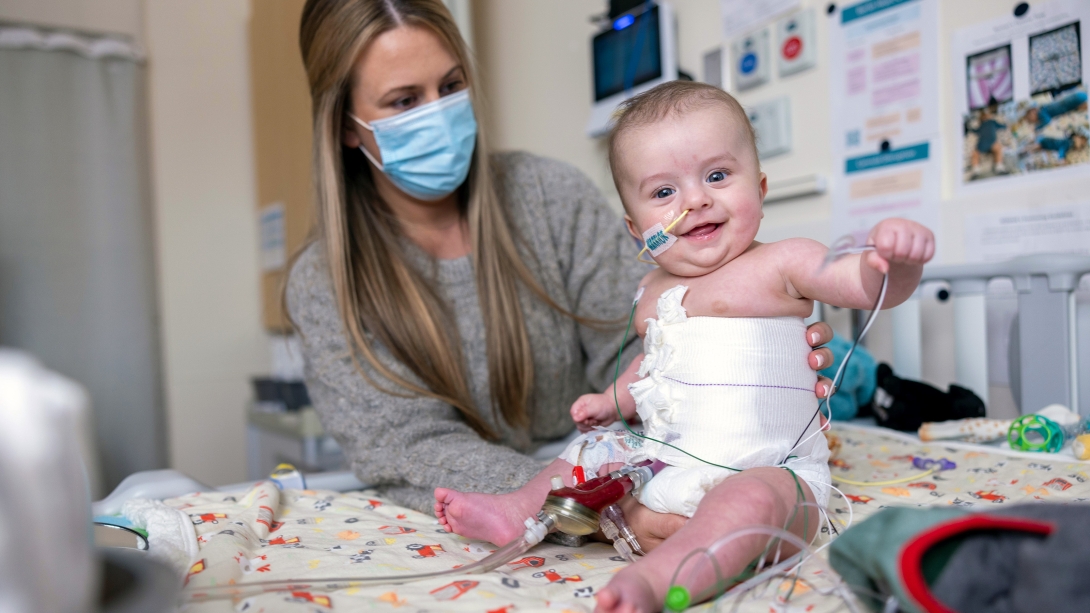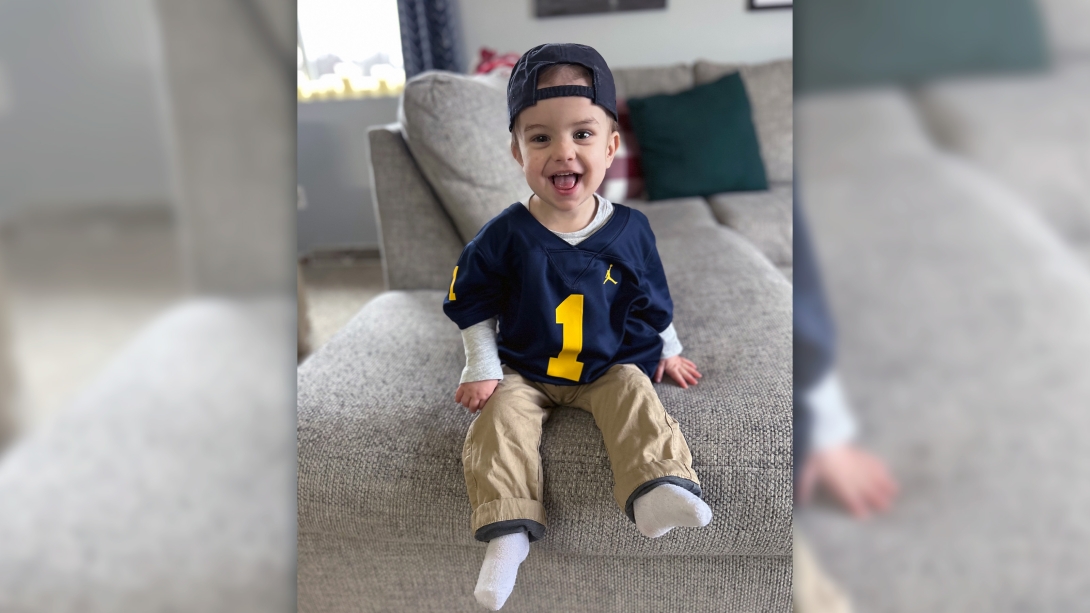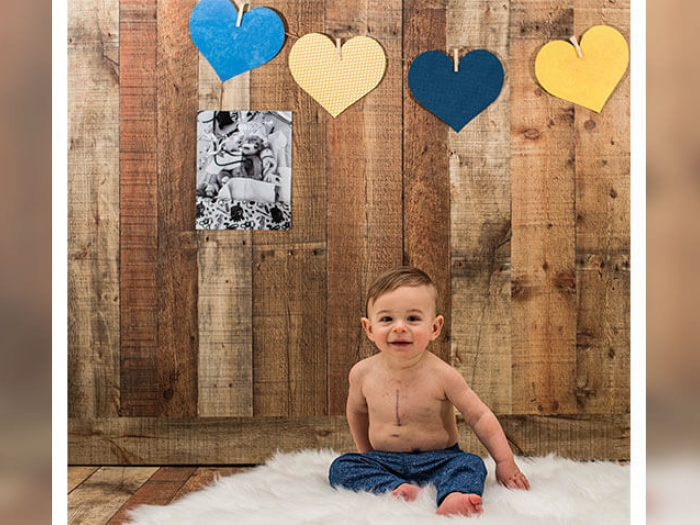Being named after four-time WWE Championship title holder Roman Reigns means having an innate toughness
5:00 AM
Author |
Ashley and Tony DiLeo knew their child would be tough.
Before they knew about the obstacles he would face, before they even knew their baby’s gender, Roman was Roman and he was a fighter.
His name comes from four-time World Wrestling Entertainment (WWE) championship title holder Roman Reigns. Around 12 weeks into their pregnancy the couple was watching WWE and noticed the professional wrestler who has publicly shared his journey with leukemia.
“He was so stoic and powerful,” Ashley DiLeo said. “He didn’t say anything, but he had such a presence.”
That’s when they chose their baby name.
Diagnosis
It was at a routine ultrasound several weeks later, when the couple learned about the first obstacle their baby would face.
Roman was diagnosed in-utero with what David Peng, M.D., the director of pediatric heart failure and mechanical circulatory support at University of Michigan Health C.S. Mott Children’s Hospital, described as “the most extreme and severe case of newborn dilated cardiomyopathy” he’d ever seen.
The condition meant Roman’s abnormal heart was too weak, thin and stretched out to adequately pump blood throughout his body. Or, as Peng said, his heart was not “doing anything a heart should do.”
Doctors monitored Roman’s health during the pregnancy before an induction was scheduled at 38 weeks at U-M Health Von Voigtlander Women’s Hospital.
Ashley DiLeo described the drive to Ann Arbor on that June day in 2022 as “nerve wracking.”
“One, I don’t know what’s going to happen after he’s born and two, I’m about to have a baby and I don’t know what that’s going to be like either,” she said.
But after a labor and delivery without complications, she finally met her son.
The medical team put the brown eyed newborn on his mother’s chest for brief skin to skin contact before he was taken to another room for monitoring.
By the end of his first week of life, it became clear he would need extraordinary support to keep him alive. At that point, he was put on a Pedimag ventricular assist device (VAD) while waiting for a longer term support device, called a Berlin Heart, to arrive. At two weeks old, he received the Berlin Heart to help stabilize his circulation for the time being.
But his parents and medical team knew the only way to move forward was a heart transplant.
“The heart pump not only kept him alive but allowed him to grow and thrive as a baby, allowed him to meet developmental milestones and got him in the best shape possible for the heart transplant,” Peng said.

The Berlin Heart certainly posed some challenges to the DiLeos who were eager to hold their baby.
“It was kind of intimidating seeing it at first,” Ashley DiLeo said. “This generator with some tubes is keeping your baby alive and you want to be careful.”
But with help from the nurses at Mott, they quickly learned to adjust to the device and get into a routine that allowed them to bond and connect with Roman.
Through it all, he has always been the most charming and charismatic little guy. He definitely has a personality big enough for the world of pro wrestling and I know he’d be one of the good guys! It has been such a joy to see him thrive.”
—David Peng M.D.
Waiting for the right heart
After months on the waiting list, the U-M Health transplant team learned that there was a possible heart for Roman. The DiLeos were alerted and brought Roman to the hospital, the operating room was prepared, and the team was on standby.
Then the news came. It was not a viable heart for Roman.
The transplant team that had been working with the DiLeo family approached them sympathetically to share the news. Despite the initial shock, the couple thanked them, not only for the knowledge, but also for the courage to make the decision that the heart was not the right one for Roman.
“We kind of took it as a blessing and a validation that U-M and Mott had our best interest in mind and were going to do everything to make sure Roman was going to be taken care of, not as a quick fix but for a very long time,” Tony DiLeo said.
When the second call for Roman came after nearly half a year supported with a heart pump, they were cautiously optimistic. They also knew what to expect: a full day of family time before the team would come to take him to the operating room.
This time they got the green light. The heart was a perfect match.
Then came hours of receiving regular updates during surgery – and then finally relief.
“Getting the call that Roman was done with surgery and everything went great was a huge weight off our shoulders,” his mother said.
Once Roman was well enough to be discharged, staff from every department in the hospital that had gotten to know the then seven month old came to show their support. They lined the hallway to clap for him as he left the hospital with his new heart.
“Walking out of his room and carrying him down the hallway for the first time and seeing all of these people you’ve become friends with, made connections with and just love Roman unconditionally, it was just the most happy and overwhelming thing,” Ashley DiLeo said.
Another obstacle
The family was just starting to adjust to their new normal at home near Grand Rapids, which included a regimented medication schedule, and many follow up appointments with therapists and pediatricians.
But just a few months after discharge, Roman came down with his first cold and needed to be readmitted to the hospital given his immunocompromised status. Over the next few months, they noticed a few other concerning symptoms and scans confirmed that Roman, like his namesake, had cancer.
In their son Roman’s case, it was post-transplant lymphoma.
“As far as hearing it…gut punch, emotions flutter,” Tony said. “You’re just upset and overwhelmed. It takes you to a numb state almost where you try to wrap your head around it.”
Following a transplant, many patients such as Roman take anti-rejection medication that can leave them at a high risk for infection and some forms of cancer, Peng explained. He said that one in 10 people develop a form of cancer following a transplant.
Creating a treatment plan wasn’t as straightforward as his heart transplant.
“I was told matters of the heart are very black and white, but cancer is a very gray area,” Ashley DiLeo said.
Roman underwent a six course treatment of two medications and after four weeks, there was no detection of cancer on his scans.
“He just keeps getting hit with different obstacles to jump through and without any question, he just knocks them out,” his father said.
While in the hospital, he certainly won the hearts of his medical team with his fighting spirit.
“Through it all, he has always been the most charming and charismatic little guy,” Peng said. “He definitely has a personality big enough for the world of pro wrestling and I know he’d be one of the good guys! It has been such a joy to see him thrive.”
Back to some normalcy
Since entering remission, Roman, now two, has continued living as any other toddler. He’s curious about the world around him and is learning how to play with others.

“We are the most grateful and blessed people in the world because we were specifically chosen to be his parents and help him navigate life,” Ashley DiLeo said.
She said as they continue to adjust to life outside of the hospital with Roman, they are grateful for the care they received at Michigan Medicine.
“They really only have the child’s best interest in mind,” she said. “They are fully invested with each individual person and each individual family, and they make you feel like you are family.”
After their journey, the couple hopes to help others going through a similar experience.
“The best piece of advice is to feel the emotions right off the bat, and obviously they’re difficult to get through, but take a deep breath and then really focus on what plan is put in place,” Tony DiLeo said. “It really is as simple as ‘control what you can control and make sure you’re there for your child.’"
Sign up for Health Lab newsletters today. Get medical tips from top experts and learn about new scientific discoveries every week by subscribing to Health Lab’s two newsletters, Health & Wellness and Research & Innovation.
Sign up for the Health Lab Podcast: Add us on Spotify, Apple Podcasts or wherever you get you listen to your favorite shows.

Explore a variety of health care news & stories by visiting the Health Lab home page for more articles.

Department of Communication at Michigan Medicine

Want top health & research news weekly? Sign up for Health Lab’s newsletters today!





